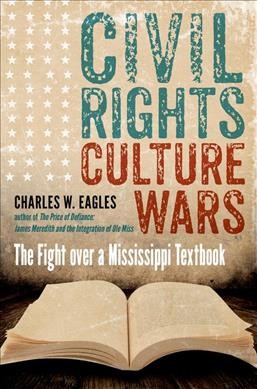By Jere Nash. Special to the Clarion-Ledger Sunday print edition (July 9).
 Not until 1980 were Mississippi high schools allowed to use a textbook that accurately and dispassionately covered the entire history of the state, complete with the horrors of slavery, the motives behind the Civil War, the value of Reconstruction, and the triumphs of the civil rights movement. Civil Rights, Culture Wars: The Fight Over a Mississippi Textbook (University of North Carolina Press) by University of Mississippi historian Charles Eagles explains how it happened.
Not until 1980 were Mississippi high schools allowed to use a textbook that accurately and dispassionately covered the entire history of the state, complete with the horrors of slavery, the motives behind the Civil War, the value of Reconstruction, and the triumphs of the civil rights movement. Civil Rights, Culture Wars: The Fight Over a Mississippi Textbook (University of North Carolina Press) by University of Mississippi historian Charles Eagles explains how it happened.
Several years ago, the University of North Carolina Press published The Price of Defiance: James Meredith and the Integration of Ole Miss, the authoritative account by Eagles of the one event in the 1960s that defined Mississippi for the rest of the nation.
The disastrous response of whites in our state to the demand for civil and voting rights was prompted in part by 80 years of school textbooks that marginalized black men and women and distorted black history.
Eagles is unsparing in his descriptions of those earlier textbooks: one explained that “the life of a slave [was] pleasant,” while another textbook defended the role of the Ku Klux Klan, while yet another applauded the 1890 Constitutional Convention in seeking to “insure control of the state by the white man.” After eight decades of indoctrination of generations of white Mississippians with historical myths, it is not hard to see how that helped to fuel the fire of massive resistance.
![]() Which brings us to James Loewen and Charles Sallis. In the 1970s, Loewen, a professor at Tougaloo College, and Sallis, a professor at Millsaps College, began to work together on a new kind of textbook, called Mississippi: Conflict and Change, that, as Eagles writes, “argued that conflict produces change, and [that] embraced controversial subjects related to race and class, examined unpleasant subjects such as economic depressions and violence, and included subjects neglected by other books–blacks, women, workers, and the arts.” Eagles takes us through how the book was researched, written and ultimately published in 1974.
Which brings us to James Loewen and Charles Sallis. In the 1970s, Loewen, a professor at Tougaloo College, and Sallis, a professor at Millsaps College, began to work together on a new kind of textbook, called Mississippi: Conflict and Change, that, as Eagles writes, “argued that conflict produces change, and [that] embraced controversial subjects related to race and class, examined unpleasant subjects such as economic depressions and violence, and included subjects neglected by other books–blacks, women, workers, and the arts.” Eagles takes us through how the book was researched, written and ultimately published in 1974.
Getting the book published, though, didn’t automatically mean it would show up in high schools. In Mississippi, then as now, a state board approves the textbooks for classroom use. And in November 1974, the board said no to Conflict and Change. With access to rich primary material, Eagles gives us a perceptive behind-the-scenes accounting of why that decision was made.
But the story doesn’t end there. Loewen, Sallis, and Eagles are just getting warmed up. The authors filed a historic lawsuit, asking a federal judge to force the state to accept their textbook, and Eagles delivers this development with backroom negotiations, trial testimony and lucid analysis. The litigation took six long years and was finally resolved on April 2, 1980, when Judge Orman Smith ordered the board to place Conflict and Change on the approved list.
Eagles captures the untenable position of the state in one short exchange between the judge and John Turnipseed, a teacher who rated the book unfavorably. After objecting to a photograph of a lynching because it would cause “harsh feelings in the classroom,” Turnipseed was asked by Judge Smith, “But this happened, didn’t it? Didn’t Mississippians have more lynchings than any other state?” Turnipseed testified, “Well, yes. But that all happened so long ago. Why dwell on it now?” To which the exasperated judge responded: “Well, it is a history book!”
As with his book on Meredith and Ole Miss, Eagles’ writing is marked by three qualities that I like. One, he builds the narrative around primary sources. He interviews people, he digs through old file boxes, and finds the records that tell the truth.
Two, he provides context. He not only sets the state for the story, he give us succinct biographical information on the players. The journey of Conflict and Change involved lawyers, historians, journalists, activists, including Ernst Borinski, Frank Parker, Mel Leventhal, Margaret Walker Alexander, Fred Banks, Clarice Campbell, Duncan Gray Jr., Jeanne Middleton, David Sansing, and John Bettersworth.
Third, Eagles doesn’t hesitate to give his opinion. I agreed with some, other I didn’t, but I like authors with opinions; it makes me stop and think.
I’ll close this review with an observation on the import of Conflict and Change by the incomparable Frank Parker, one of the lawyers for Loewen and Sallis: “Desegregation of the public schools in the South is now protected even more by a constitutional prohibition against maintaining racial segregation in the curriculum and in textbooks.”
Jere Nash is the co-author of Mississippi Politics: The Struggle for Power, 1976-2008, Mississippi Fried Politics, Tall Tales from the Backroom, and America’s Great Storm: Leading Through Hurricane Katrina.


Comments are closed.